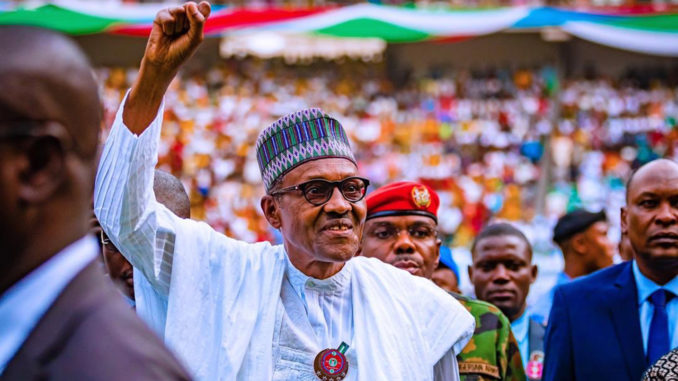
AFTER years of living in denial, the Nigerian authorities appear to have finally come to terms with the daunting nature of the ongoing counterinsurgency campaign in the North-East of the country. Instead of the usual bogus claim of having “technically” defeated the terrorists waging a jihad against the Nigerian state, President Muhammadu Buhari was a bit more subdued when he recently said that his administration had “recorded remarkable improvement in the fight against Boko Haram.”
But it is becoming increasingly difficult to turn a blind eye to the devastation in that part of the country. With Boko Haram returning to reclaim hitherto recovered territories; military bases being routinely overrun; scores of soldiers being put to the sword and the attitude of their war-weary colleagues sometimes verging on mutiny, over alleged lack of basic supplies, including weapons, it is difficult to see what is “remarkable” about the improvement in the asymmetric war. Nigeria should know by now that she has a battle on her hands and the forces have to really knuckle down if they are to thwart the morbid ambition of the terrorists.
For the past 10 years, the country has been battling what at the initial period looked like a ragtag band of religious extremists targeting mainly symbols of state authority. There is a need for a tactical re-evaluation. This is very important, considering that the military doing the battle on behalf of the rest of Nigerians have cried out that they are no longer contending with Boko Haram in its original form, but with die-hard, battle-tested Islamic State fighters forced to flee the conflict zone in the Middle East.
In a New Year message to the soldiers, the Chief of Air Staff, Sadique Abubakar, made reference to “experienced and skilled fighters and technology, as ISIS fighters, dislodged from Syria, relocated to the North-East of the country.” This admission gives the war against these hard-nosed extremists an international flavour that can only be handled by multinational troops far beyond what is currently in place. Although Boko Haram had already been acknowledged worldwide as a formidable destructive force, the lethal mix with ISIS further makes it an imperative to change the approach to the campaign. The Nigerian situation demands the same approach that was adopted in Syria and Iraq.
To many Nigerians, the confession about the presence of ISIS members in Nigeria must have come as a shock, but it was a natural course of development long foreseen by those knowledgeable in the modus operandi of Islamist terrorists; they never give up. Usually, when under intense pressure, they hibernate and try to bounce back when the heat is off. That is why groups like al-Qaeda, Taliban and al-Shabbab have refused to die; they will either splinter and form new groups or relocate to other ungoverned or weak territories where they continue with their sanguinary pursuit.
Long before the situation got to what it is today, the signs had been there that if Boko Haram was allowed to smoulder, Nigeria would become a favourable destination for those dislodged from Syria and Iraq. The signs became more glaring when Boko Haram pledged its allegiance to ISIS and Abu Musab al-Barnawi, the son of Muhammadu Yusuf, the late founder of the group, supplanted Abubakar Shekau as the new leader in 2015. This led to a schism and the birth of the Islamic State’s West African Province, as Shekau refused to submit to the authority of the new leadership.
Nicholas Rasmussen, the then Director, United States National Counterterrorism Centre, warned at a congressional hearing in 2015 that there was an “increased communication between Boko Haram and other terrorist groups in north-western part of Africa and even with ISIL (another acronym for IS).” Libyan foreign minister, Mohammed al-Dairi, in an interview with Hayat, a newspaper, also affirmed the existence of a “dreadful terrorist network between IS in Syria and Iraq, in Libya and Mali and Boko Haram.”
That was the rebuilding period when the terrorists were ousted from their Sambisa Forest base. Rather than follow through with a mop-up, they were allowed to reorganise and bounce back with venom. Following stories of repelling Boko Haram attacks – instead of taking the fight to their hideouts – the narrative now is that of the criminals hoisting their filthy flags in Borno villages and towns. The war has obviously turned a full circle.
It is now time for a reality check. As has been said repeatedly, this fight has become an international battle that can no longer be handled the way Nigeria has been going about it. Reports of those dislodged from Baga, a town in Borno State that has suffered much assault from the Islamists, are not heart-warming. The sighting in the jihadists’ arsenal of sophisticated weapons such as rocket launchers and anti-aircraft guns, according to those reports, bears all the evidence of foreign support and infiltration by ISIS fighters.
Although the Nigerian forces have responded by acquiring more sophisticated warplanes for aerial bombardment and establishing special forces, more efforts should be made to get all round foreign assistance. Stories emanating from the battleground sometimes show that the morale of the soldiers is low, which is why some of them resisted further deployment last year. It was also reported that 190 policemen fled their training camp because they were supposed to be deployed to face Boko Haram. The authorities should try to motivate the combatants by ensuring that they are well armed and all their entitlements paid. Those who overstayed in the warfront should be redeployed and new ones posted there. With adequate motivation and strong international collaboration, the days of terrorists in Nigeria could be numbered.
END

Be the first to comment